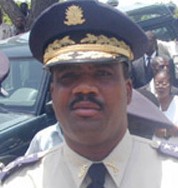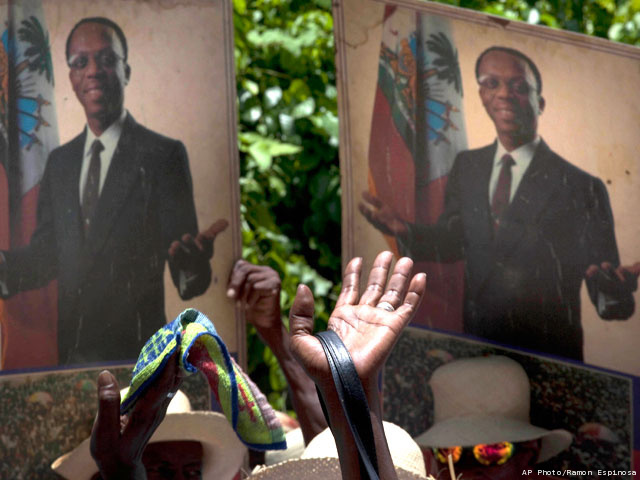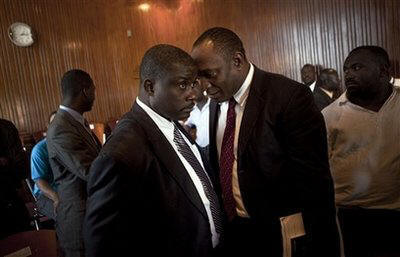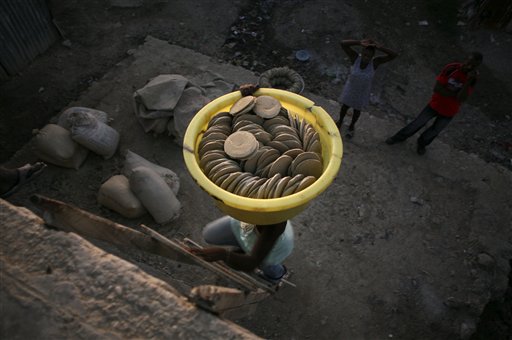
| Want to send this page or a link to a friend? Click on mail at the top of this window. |
More Special Reports |
| Posted November 11, 2009 |
| Last updated September 1, 2010 |
|
After Journeying in a U.S. Jail Cell, Lucien, a Deposed |
|
Haitian Dictator Aristide's National Chief |
|
of Police Is Ultimately Deported to Haiti |
CAMBRIDGE, MA, Nov. 11 - Jean Nesly Lucien, 48, a deposed totalitarian Haitian dictator Jean-Bertrand Aristide's former national police chief, who was incarcerated for a prolonged time, approximately 4 years, in a state of Florida federal prison, after a verdict of culpability was returned against him by a jury for permitting himself to largely traffic in narcotics (money laundering), with the United States as his ultimate market, but in early January regained his liberty, though conditional, was again taken out of the circulation, this time, by Homeland Security agents, early Tuesday morning (approximately 8:00), as he was en route to a fitness establishment, commonly known as gym, not too far from his official residence, in the nearby north of Boston small working class city of Malden.
 |
| Jean Nesly Lucien, a former deposed tyrant Jean-Bertrand Aristide (A get rich scheme collapses leaving Haiti even poorer), an alleged accomplished modern version of Carlo (or Charles) Ponzi's national police chief in an undated photo. (wehaitians.com photo/file) |
|
|
|||
|
Mr. Lucien was ultimately deported to Haiti, where, as a national chief of police, he helped deposed President Jean-Bertrand Aristide usher a new period of totalitarian dictatorship supremacy over democracy, from the United States, Tuesday, November 24, 2009. He arrived in handcuffs and chains in his troubled native Caribbean nation with 26 other fellow convicted Haitian citizens. Like him, many of them had served time in U.S. prisons for drug trafficking. Unlike most of his fellow deported compatriots, if not all of them, Mr. Lucien was briefly interrogated by Haiti police after they detained him. In his case, assumedly a simple formality since he is a former law enforcement chief of this small, mountainous corner of the Caribbean, where the vast majority of citizens, unfortunately, continue to be subject to the purgatory of gridding poverty. He will most likely soon be permitted to return to the embrace of family members instead of customarily journeying in a Haiti's jail cell until bribes are paid in return for his liberty. In the case of deported female detainees (Claudette Etienne), especially those who are corpulent, sometimes all that is required for them to regain their liberty are unreciprocal sexual favors. |
|||
|
| Are they Mr. Lucien's millions of narco-dollars? |
Mr. Lucien's latest arrest came two days after he was dismissed from his post of security guard at a Boston's ultra-luxury hotel. And this, after the lodging establishment Human Resources Department's customary random process of looking up and compiling criminal records on employees first revealed that he was a convicted drug lord who had served time in prison, in fact years. Judged to be extremely dangerous, consider the exorbitant (economic) cost of redeeming the hotel's reputation, by way of public relations, as more than a safe place, had guests become aware that he largely navigated in the world of criminality, immediately thereafter he was escorted out of the building that also provided meals and other related services to the travelling public on a commercial basis by armed security agents.
| $Wehaitians.com urgently needs your financial contributions$ |
Mr. Lucien, whose level of formal education is pedestrian, meaning that he does not possess a high school diploma or the equivalent of so, Graduate Examination Diploma, commonly known as G.E.D (in the U.S., approximately 800,000 people subject themselves to the rigors of the exam; the number of those who pass it is inferior to 470,000 or less than 60 percent), still he was able to become a national police chief, was a participant at a late Sunday afternoon well-attended political gathering, in Braintree, a pleasant suburb, near and south of Boston.
Jean Harry Céant, the chairman of the newly formed political party, "Aimer Haiti" or Love Haiti?, who unadroitly attempted to demonstrate the potency of his political formation's big ideas for dirt-poor Haiti (it is a ward of the United Nations, and at an economic cost of $617 million annually), is more than an Aristide's (his rule brought a murderous curse and untold suffering upon the vast majority of the Haitian people) die-hard disciple. He is believed to practize grand-scale corruption (a Damocles sword); alternately, he is an extremely corrupt man, too.
 |
| The Prophet of Deception: Jean-Bertrand Aristide, who unreservedly referred to himself as a prophet, his rule brought a murderous curse and untold suffering upon the vast majority of the Haitian people. (AP Photo/Ramon Espinosa) |
Still, Mr. Céant, a largely disorganized, dysfunctional man who lacks the charisma, political skill and rhetorical brilliance of a true politician, wants to assume the first magistrature of the republic of Haiti - the poorest nation in the Western Hemisphere and one of the most corrupt ones in the world, on a scale of 0 to 10, according to Transparency International, a global civil society organization leading the fight against corruption - even if he is not duly elected. There is a reason for this. He knows that his chances of being duly elected president are infinitesimally slim. Sure it requires an exquisite kind of lunacy.
More, perhaps he will subsequently use his alleged narco-fortune to be in close proximity with God, and this after he becomes a de facto head of state.
|
|
|
|
|
||
| Haiti's outgoing Director General of the Haitian National Police, Jean Nesly Lucien (in suit far left), shakes hands with Jean-Claude Jean-Baptiste (an accused murderer, a drooling mental defective man), his replacement, following the official transfer of power at police headquarters in Port-au-Prince, Haiti on Wednesday, March 26, 2003. (AP Photo/Daniel Morel - wehaitians.com, file). At right is Jean Henry Ceant, a Haitian presidential candidate who late last year embraced in public, Mr. Lucien, a custody convicted drug lord, during a political meeting in the pleasant Braintree suburb, south of Boston. He is believed to be deposed murderous dictator Jean-Bertrand Aristide's secret weapon of mass destruction to further the unwanted suffering of the vast majority of the Haitian people. (Photo, courtesy of Jeunehaiti.com-added, Sept. 1,2010) |
If I may further express myself, in relation to Mr. Céant's pronounced lack of organization, a fact that may attest to so is that the public meeting, by way of which a cabal of sinister Aristide's establishment figures, including Camille Leblanc, a former justice minister, further sought to lengthen in duration the incomparable suffering of the vast majority of the Haitian people, as they themselves continued to have more than a respectable quality of life, by western standards, rather than convincingly giving those in attendance hope that with the help of their group's political program, economic plan their fellow compatriots back home (approximately 80 percent of them survives on a sum that is significantly inferior to U.S.$2 daily) will soon rightly have their own place reserved in the march of even more economic opportunities, too, commenced at 5:11PM - more than two hours after the 3:00PM time first communicated to the public, by way of paid radio advertisements, and with a lot of fanfare.
Mr. Lucien, who is said to have violated the terms of his parole by not distancing himself, at least physically, from Haitian events that tend to be of political nature; also, by permitting himself to have lengthy telephone conversations, at least three, with Aristide (My quality of life, your quality of life), a man with an egregious human rights record, who since early 2004 has been in exile in South Africa, the day before the Braintree meeting, remains jailed until he is ultimately deported to his home country of Haiti, where he reportedly owns a towing company, within eight days of his arrest - unless otherwise.
Not that there is something wrong with living in your land of birth, the nation where you were reared. Also, a small corner under the sun where the loss of more than 98 percent of forests, though all small, is attributed to citizens' over-reliance on charcoal for energy - from cooking rice to boiling water to prepare coffee, for example. How significant is the percentage of the niggardly (disregard the phonetic similarity to the racial slur "nigger;" the two words are, however, completely unrelated etymologically) national budget that is devoted to environment? Arguably, the answer to this question is certainly deceptive. The budget shows only 0.71 of a percentage point. Unfortunately, Haiti, continues to be a small troubled Caribbean piece of land where government institutions are superbly chaotic, as the last month's dismissal of Prime Minister Michele Duvivier Pierre-Louis (the fifth chief of government since 2004) further affirmed - another item in a mighty catalogue of problems.
 |
| Haiti's Senators Youri Latortue, center right, and Jean Baptiste Jean Willy, center left, speak before a Senate session in Port-au-Prince, Thursday, Oct. 29, 2009. Prime Minister Michele Pierre-Louis was facing a challenge Thursday from senators in the president's party, Lespwa (hope), who are trying to remove her, a move that could hinder international efforts to increase foreign investment in Haiti.(AP Photo/Ramon Espinosa). Mr. Latortue, the nephew of former Interim Prime Minister Gerard Latortue, was the main subject of a December 2005 investigation by The Miami Herald into drug trafficking in Haiti. |
A grave error for a nation that cannot even dream of meeting the rudimentary requirements, by Third World standards, for foreign direct investment, in the near future. For example, its apparent democracy remains fragile; last year alone, the economic cost of imported diesel fuel - nearly all from Venezuela and at a discount price, since Haiti was a member of President Hugo Chavez Petro Caribe initiative - to power its electrical generators was in the vicinity of $380 million. Still, blanket blackout continued to be the norm, and it is still so today. As a result the vast majority of citizens are rather under the impression that Thomas Edison has yet to arrive in their mountainous nation. Still, government officials, though they do not have even a basic economic development plan (one that will, hopefully, also have a direct impact on widespread absolute poverty, increasingly inequitable income distributions, and rising unemployment), apparently are inclined to see large capital in-flaws.
Yet, Haiti, where last year there were 1.9 million "food insecure" Haitians, meaning that those facing starvation, out of an estimated population of 8.7 million, cannot be a happy place. Despite of its unwanted classification as a low-income country, that is its position is in many ways significantly different from that of the currently developed countries when it embarks on its era of modern economic growth; it managed to secure the required funds to finance the purchasing of a significant portion of the basic foods needed for final consumption from abroad at an approximate economic cost of $400 million - an encore. Still, citizens, in fast increasing numbers, were famously resorted to eating dirt, in the form of baked clay "cookies," until the Caribbean nation finally became the scene of food riots as commodity prices rose to record highs and the cost of imports soared, significantly reducing the purchasing power of the reduced number of both men and women who before could barely afford the prices of even needed foods, to stay alive, to keep themselves going.
Especially those who contracted H.I.V., the virus that causes AIDS (When blame is again unjustly assigned to Haitians for the pandemic, AIDS), were no longer hopeful that they would be capable, in the near future, to optimize their chances of surviving and thriving since one of the steps needed for both, that is the consumption of available food, would be indefinitely scarce. Sure the grossly incompetent government of Rene Preval (his formal education), the extreme violence-issued administration of Rene Preval first failed to realize that there was more than one hypothesis relating to solving, even in part, the food problem, in the short-run.
 |
| A petite, frail young woman selling mud cookies at an outdoor market in Port-au-Prince, Haiti. AP Photo/Ariana Cubillos - wehaitians.com, file) |
Haiti will most likely remain a net importer of food, and for a longtime so, since the Haitian government has earmarked 6.95 percent of its 2009-2010 minuscule national budget (revenues: $967.5 million; expenditures: $1.162 billion, 2008 est.), its largely foreign aid-dependent budget (70 percent), instead of the 12 percent suggested by the United Nations' food agency, Food and Agriculture Organization (FAO), in an effort to help increase its total domestic food production, though by way of subsistence farming - despite its risk aversion, uncertainty, and survival.
What is also clear is that today only foreign missionaries, though in fast decreasing numbers, dare venture into mainland Haiti as it continues to be referred to as a place where you can be easily kidnapped for ransom. The government, which has a reputation for confusion, inefficiency and worse, its response is best explained by the allocation of 0.23 percent of the national budget (2009-2010) allocated for the promotion of national tourism. Not so for Labadee (A Haitian Eden), Royal Caribbean's private and heavily guarded enclave, on the north shore, where 800,000 citizens from a multitude of nations last year happily visited. The world second-largest cruise line, with 35 ships (behind the combined Carnival and Carnival plc Behemoth), is spending $55 million on enhancements to that small paradise-like so the world's largest ship can be accommodated.
Sadly, this is the nation that Mr. Lucien helped destroyed, in scale, after he became a narco-national chief of police. As a top official in the chain of command of Haiti's police department who navigated in the world of crimes, he certainly deprived the sunshine state's citizens of his honest service. And soon, this is where he will most likely be, and against his will.
So what ultimately happened on Tuesday, November 24? Mr. Lucien was ultimately deported - in fact, the final shaming (the oldest form of punishment). Sure, he belongs in a penitentiary, and for a longtime - not in the embrace of family members.
Yves A. Isidor, who teaches economics at the University of Massachusetts-Dartmouth, is executive editor of wehaitians.com and spokesperson for We Haitians United We Stand For Democracy, a non-partisan political pressure group.
| Wehaitians.com, the scholarly journal of democracy and human rights |
| More from wehaitians.com |